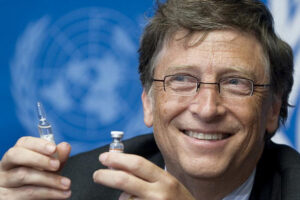Bill Gates Appears to Have Bought Off Health Regulator That Approved His New Covid Vaccine
Bill Gates Appears to Have Bought Off Health Regulator That Approved His New Covid Vaccine

Bill Gates, Co-Chair the Bill & Melinda Gates Foundation shows a vaccine during the press conference. UN Photo / Jean-Marc FerrŽ
Bill Gates, Co-Chair the Bill and Melinda Gates Foundation shows a vaccine during the press conference. Click to enlarge
Microsoft co-founder Bill Gates and his foundation, the Bill & Melinda Gates Foundation, are the primary source of funding for the UK’s Medicine & Healthcare Products Regulatory Agency (MHRA), the health regulator that granted emergency authorizationfor vaccines developed by companies in which Gates has financial interests.
The MHRA also recently approved a new Covid vaccine backed by Gates’ funding called SKYCovion that is approved for people aged 18 and above. The foundation holds significant shares in Pfizer and BioNTech, two major pharmaceutical companies.
In June 2021, the MHRA extended the emergency authorization for Pfizer/BioNTech mRNA vaccines to be administered to children between the ages of 12 and 15 in the UK. The decision was based on the agency’s review of clinical trial data, which the Chief Executive, Dr. June Raine, claimed demonstrated the safety and effectiveness of the Pfizer vaccine in this age group, with the benefits outweighing any risks. However, critics argue that the statement contradicted the findings of a small-scale study that showed a high rate of adverse reactions among the children involved.
The Pfizer clinical trial included 1,127 children, but only 1,097 completed the trial, with 30 participants dropping out after receiving the first dose of the vaccine. The reasons for their withdrawal are not provided in the publicly available information from the FDA. Despite these concerns, the MHRA granted emergency authorization for the Pfizer/BioNTech vaccine’s use in children.
The fact that Bill Gates has financial interests in both Pfizer and BioNTech, along with being the primary funder of the MHRA, raises questions about a potential conflict of interest in the decision-making process. The Bill & Melinda Gates Foundation acquired shares in Pfizer in 2002 and increased their value by promoting Pfizer’s vaccines in the media in September 2020. During a CNBC interview, Gates expressed his confidence in the Pfizer vaccine, even though he lacks formal medical or scientific qualifications. Furthermore, the foundation purchased $55 millionworth of shares in BioNTech shortly before the Covid-19 pandemic began in 2019.
In 2017, the Gates Foundation granted £980,000 ($1.28M) to the MHRA for collaboration purposes. In response to a Freedom of Information request, the MHRA disclosed in May 2021 that the Gates Foundation’s current level of grant funding amounts to $3 million, supporting various projects.
The MHRA also recently approved a new Covid vaccine backed by Gates’ funding that was developed in South Korea. The vaccine, named SKYCovion, combines a portion of the SARS-CoV-2 virus spike protein with GSK’s AS03 adjuvant technology in a self-assembled nanoparticle vaccine. It is important to note that the MHRA has highlighted several critical points regarding the vaccine’s use and limitations.
The duration of protection provided by SKYCovion is still being determined, as ongoing clinical trials continue to assess its efficacy. The vaccine’s effectiveness and safety have not been evaluated in immunocompromised individuals, including those undergoing immunosuppressant therapy. Furthermore, the vaccine’s impact on pregnant women and whether it is excreted in breast milk remain unknown.
Professor Norman Fenton, a renowned British scientist, has expressed concerns about the vaccine’s approval and is submitting a Freedom of Information request to MHRA Chief Executive June Raine to seek clarifications. Fenton believes the vaccine’s expedited approval warrants intense scrutiny.
The patient information leaflet highlights various potential side effects, and it emphasizes that two doses are required, with a 28-day interval between them. Following the second dose, a 15-minute observation period is recommended.
It is noteworthy that SKYCovion has not received approval from any other Western country thus far. However, the European Commission is reportedly considering its rollout across EU nations.
These findings raise concerns about potential conflicts of interest, as the primary funder of the MHRA and a shareholder in the vaccine-producing companies appears to have influenced the regulatory decision-making process.



Comments
Post a Comment